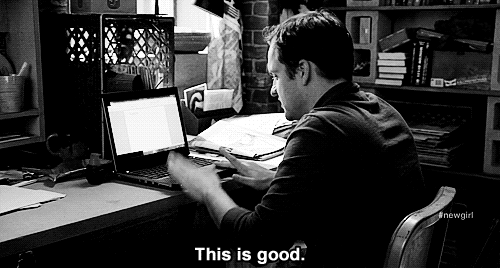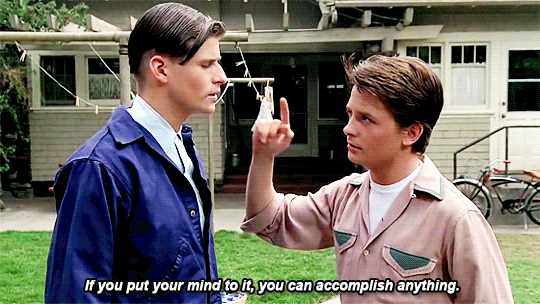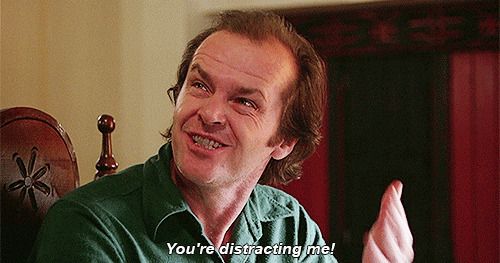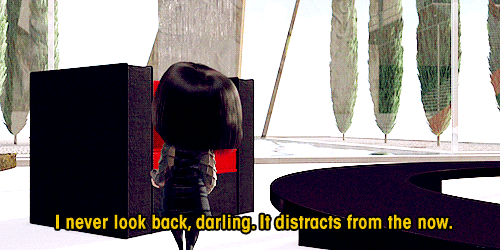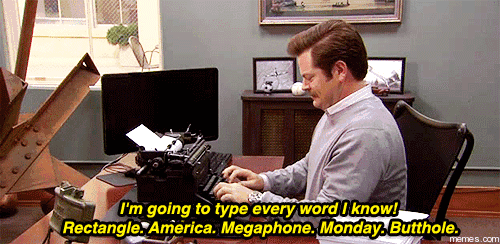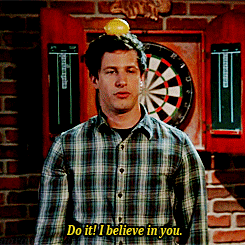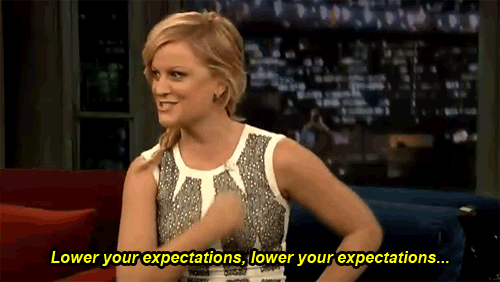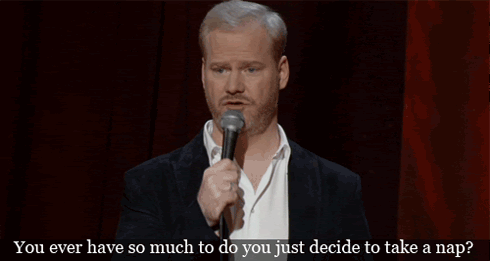It is the beginning of November, which means a few things. The Pumpkin Spice Everything is transitioning to Peppermint Everything. The seasonal aisle at your local mega-mart is switching from costumes and cobwebs to tinsel and candy canes. Daylight has been saved, which somehow means that it gets…dark…earlier?
And, if you’re a writer, you may be considering — or already be in the throes of — NaNoWriMo, or National Novel Writing Month.
What is NaNo? Simply put, it’s a challenge for writers to churn out 50,000 words of their own original work of fiction in 30 days. Thousands of writers take the challenge every year, to varying levels of success. And though you may never have heard of it before, some of the bestselling novels of the past few years have gotten their starts as NaNo projects, such as The Night Circus, Water For Elephants, The Scorpio Races, and Fangirl. (It’s worth pointing out that none of these projects were finished — not even a complete draft — in a single month, which we’ll be circling back to in a bit, but NaNo was absolutely part of their origin stories.)
Confession time: I’ve never officially done NaNo. As in I have not signed up on the website, picked a username, and filled up my progress bar until I “won.” (Really, the main reason I’ve never participated in NaNo is because I know me, and I’m pretty sure I’d get way too distracted by the social aspect of Officially NaNo-ing to…you know…actually write a book. But if you are not as distractable as me, you probably won’t have this problem.)
However, I have written over 50,000 words in a month of my own original work of fiction, so I’m not coming from a totally ignorant place here.
If you’re braving the NaNo waters this year, congrats! Bonus congrats if you’ve never attempted to write a novel before, or have but have never completed one. Novel writing, much like training for a marathon, requires determination, perseverance, and the willpower to press ahead even when your mind and body want to quit. It’s a trudge, not a sprint, and you have to put in a lot of time and effort before you feel yourself making significant progress toward your goal. NaNo helps speed the process along by forcing you to slap a whole bunch of words onto paper in a relatively short period of time, but when you’re pushing yourself, even a month of consistency can be a huge challenge.
So if this is your first NaNo, it’s understandable if you’re daunted. But you can do this. I believe in you.
To help you out, both with the process and with your expectations, here are ten tips to get you through the month. As with all writing advice, YMMV, but hopefully some of this will help.
1. Prioritize your writing time.
Here’s a secret. No one ever “has time” to write a book. There are always day jobs, families, schoolwork, housework, extracurriculars, kids, travel, on and on and on. Anyone who thinks “I would love to write a book one day when I have time” will probably never write a book. Most first novels are written in the cracks of life — during teacher planning sessions, after the kids go to bed, on the on the subway, in the car rider line after school, in the mornings before work.
The trick, like with anything else you value, is to make your writing time sacred. Don’t think you’ll just squeeze it in around all the other, more important stuff in your day. Block off time each day to write, and hold yourself to it. Even when you don’t feel like it. Get off social media, turn off the TV, put on a pair of headphones, and buckle down. You don’t have to get all your words in at once — if the only way for you to fit writing into your schedule is 15 minutes here and 30 minutes there, then by all means, write in chunks. But during those chunks, make writing the priority. All the other pulls of life will still be there when you come up for air.
2. Be realistic about your capabilities.
50,000 words over 30 days comes out to about 1,667 words a day. I consider myself a fairly quick writer (although there are those who put me to shame), but even when the words are pouring out, I can only hit about 800-1,000 words in an hour. So for me to hit a 1,667-words-a-day goal would involve blocking off around two hours of devoted writing time. But there are many who write slower than that — maybe only 300-500 words in an hour. And that’s okay. Speed has nothing to do with the quality of the end product. But if you are a slower writer and want to hit that daily goal, know that you’re either going to need to block out bigger chunks of your day, or make up the deficit somewhere else (like only working an hour on weekdays but full days on weekends).
The other thing to keep in mind is that even if you have eight hours of free time a day, it’s really hard to be productive for eight hours in a row. I don’t know any writers — not even multi-published authors — who can crank out 1,000 words an hour for eight consecutive hours, every day of the week. (Maybe on a tight deadline, or at a writing retreat, but that kind of burst of productivity isn’t sustainable over the course of a month.) Me, I am at my most productive when I write in 30-60 minute sprints, then take a break. It doesn’t have to be a long break, but I need to step away. And once I hit about 2,000 words in a day, my productivity tanks. It’s really hard for me to push past that. The words dry up in my brain like old toothpaste.
So for me, saying “I will block off three consecutive hours every day to write, and will set a goal of 3,000 words each day” would be highly unrealistic. If I have three hours available to me, maybe I block off two of them to write, and set myself a 1,500 word-a-day goal. Which is a little shy of the 1,667 needed to win NaNo, but close enough that I can make up the deficit on the weekends, when I have more free time, and can also take more breaks.
3. Don’t look back.
I fully understand the impulse to go back over what you wrote yesterday and clean it up. Maybe it felt clunky as you were writing it, maybe you learned something about your character that would affect their earlier actions, maybe you’ve realized you don’t want your character to go through the forest, but across the river instead. So you need to rewrite those earlier scenes, right? Wrong.
Remember your goal: 50,000 words in a month. It’ll be a lot harder to hit that goal if you begin each writing session by deleting words or messing with what you already have. Make yourself a note of what you want to change, then keep pressing forward. I promise, no matter how much tweaking you do along the way, your novel will still need to be revised once it’s done. So why spend time on that work now? Save it for later. Write the next chapter like your character chose the river, and once you have a complete draft, you can go back and polish it up.
4. Embrace your crappy first draft.
I know it doesn’t seem like this when you read your favorite authors’ published works — or maybe even when you beta read works-in-progress for friends — but no one is happy with their first draft. No. One. But you can’t edit a blank page, so it’s important to get those ideas out of your head and onto paper so that you can then revise them into something you’re happy with. Think of your first draft like slapping down a wet blob of clay on a potter’s wheel. It may be ugly and malformed, but without that raw material, the true art can never be created.
5. Eyes on your own paper.
I am blessed to have a lot of extremely talented writer friends. I am also cursed to have a lot of extremely talented writer friends. It can be so easy to fall into the trap of reading their books — especially when they’re published books — compare them to my crappy first draft, and think, I am such a hack.
The funny thing? They feel the same way. Maybe not about me, but about someone. If everyone gave up who looked at someone else’s work and thought, I can never create something as good as this, we would have no art. Nada. None. Zero. Zilch.
Similarly, everyone’s process is different. Just because your buddy John vomited 10,000 words into his computer during the first day of NaNo and you wrote 300 doesn’t mean anything. Maybe John now has a word hangover and needs to take a week off to recharge. Maybe he’ll write 100,000 words this month. It doesn’t matter. It has nothing to do with you, your project, your abilities. Keep your attention on what you are doing, not what everyone else is.
6. Understand that 50,000 words may not be a complete novel, and that’s okay.
Unless you’re writing Middle Grade, 50,000 words is probably not going to be a complete book (and even with Middle Grade, maybe not). Most YA and Adult books have a higher — sometimes significantly higher — word count than this. So if you find yourself panicking in the last week of November because you’re only halfway through your novel, that’s okay. There’s no rule that if you don’t finish in November, you won’t finish at all. Give your book the time (and words) it needs to be its best self.
For comparative purposes, here are the word counts for some popular books across several genres. (If you’re writing Adult Fantasy…buckle up for a long ride.)
Charlotte’s Web – 31,938
The Lion, the Witch, and the Wardrobe – 36,363
Matilda – 40,009
The Phantom Tollbooth – 42,156
Harry Potter and the Sorcerer’s Stone – 77,508
Shadow and Bone – 81,215
The Lightning Thief – 87,223
The Hunger Games – 99,750
Ender’s Game – 100,609
Divergent – 105,143
Twilight – 118,975
Gone Girl – 145,719
The Fellowship of the Ring – 177,227
Mistborn – 212,417
Game of Thrones – 292,727
7. Get yourself an accountabilibuddy (or several).
Whether or not you participate in the social aspect of NaNo (forums, hashtag chats, Twitter, Facebook, etc.), I highly recommend finding one or two people to hold you accountable, and vice versa. While the “we’re all at the same party” aspect of NaNo can be great and highly motivating, it’s good to have a couple people who are specifically looking at you. These are the people you can confide in when you totally blow your goal for a day, who will cheer you on when you aren’t sure you can keep going, who give you virtual high fives across the internet when you hit a milestone. While I’m not NaNo-ing this month, I do have an accountabilibuddy of my own that I’m checking in with as I work to finish my current manuscript, and I guarantee I am more productive knowing I have to check in with her at the end of every day.
8. Allow yourself to adjust your goals.
Maybe you realize a week in that you actually can’t churn out 2,000 words after working a full day at work. Maybe it just occurred to you that you probably won’t write while hosting your entire family for Thanksgiving. Maybe you get sick, maybe you get called in for overtime at your job, maybe your kid breaks her arm. Whatever the reason, life happens, and sometimes the goals we set at the beginning of the month aren’t realistic two or three weeks in. It’s okay to change them, adjust to whatever your new circumstances are. It’s also okay to realize maybe you were just too ambitious, and downshift. Every person is different. And you know what? Not winning NaNo is not the end of the world. Not one of those books I mentioned above that started as a NaNo book was completed during NaNo. Some of the authors didn’t even finish NaNo. But their books still got finished and still got published. NaNo is a tool in your author belt, nothing more. If it doesn’t work for you, throw it out and get a new tool.
9. Don’t let the creative well run dry.
It may seem like common sense to forego all other forms of entertainment while trying to churn out a book in a month, but it actually may hurt more than it helps. Sure, you probably shouldn’t binge all of Breaking Bad in a week instead of writing, but don’t go cold turkey either. Much as you may think you can create in a vacuum, this is rarely a good idea. Allow yourself to keep consuming art, whether that be books, TV, movies, music — whatever it is for you that stimulates your creative juices, keep it coming. Maybe dial it back a bit, if that’s what typically takes up all your free time — you do need some of that to write, obviously — but don’t feel like a failure if one day, the words just aren’t coming, so you decide to watch an episode of Daredevil or read a few chapters of whatever’s on your nightstand instead. Art begets art. Sometimes, all it takes to get the words flowing again is a solid infusion of someone else’s fiction.
10. Acknowledge the hard work that comes next.
Once you’ve hit your 50,000 words or completed your book, it’s easy to throw up your hands and think, Huzzah, I’m done! Alas, this is never the case. Never. Remember how we were embracing the crappy first draft? Well, now begins the hard work of polishing that sucker into something worth showing people. Read through your work. Take notes on what doesn’t make sense, what needs more fleshing out, what plot threads you abandoned mid-draft. Then go back and revise, revise, revise. Get some beta readers. Listen to their notes. Revise again. This part takes time — maybe even more time than drafting the book itself — but it’s what turns a crappy first draft into a book.
Once you have revised the heck out of your book and honestly feel it is your Very Best Work, then, and only then, are you ready to take the next steps. That may be self-publishing, it may be querying agents and pursuing a traditional publishing deal, it may be printing up a handful of print-on-demand paperbacks to pass out on street corners, I don’t know. I can’t tell you which path is right for you. All I can tell you is that the road from Crappy First Draft to Book Worth Reading is long and filled with tears and red ink.
BONUS 11: Don’t sell yourself short.
It’s easy to become daunted. To think that this is beyond you. That other people can write a book, but you can’t. Your ideas are too small. Your talent isn’t enough. You never finish things, and this is no different.
Don’t do that to yourself. Yes, writing a book is a big challenge, whether you do it in a month or a year. But just like climbing a mountain or running a race, it’s possible. All it takes is putting one foot in front of the other, one word after another, bit by bit, over and over. Don’t look back. Don’t look down. Don’t stop. And when you reach the top, the finish line, The End, you’ll be so proud to look back and see how far you’ve come.


